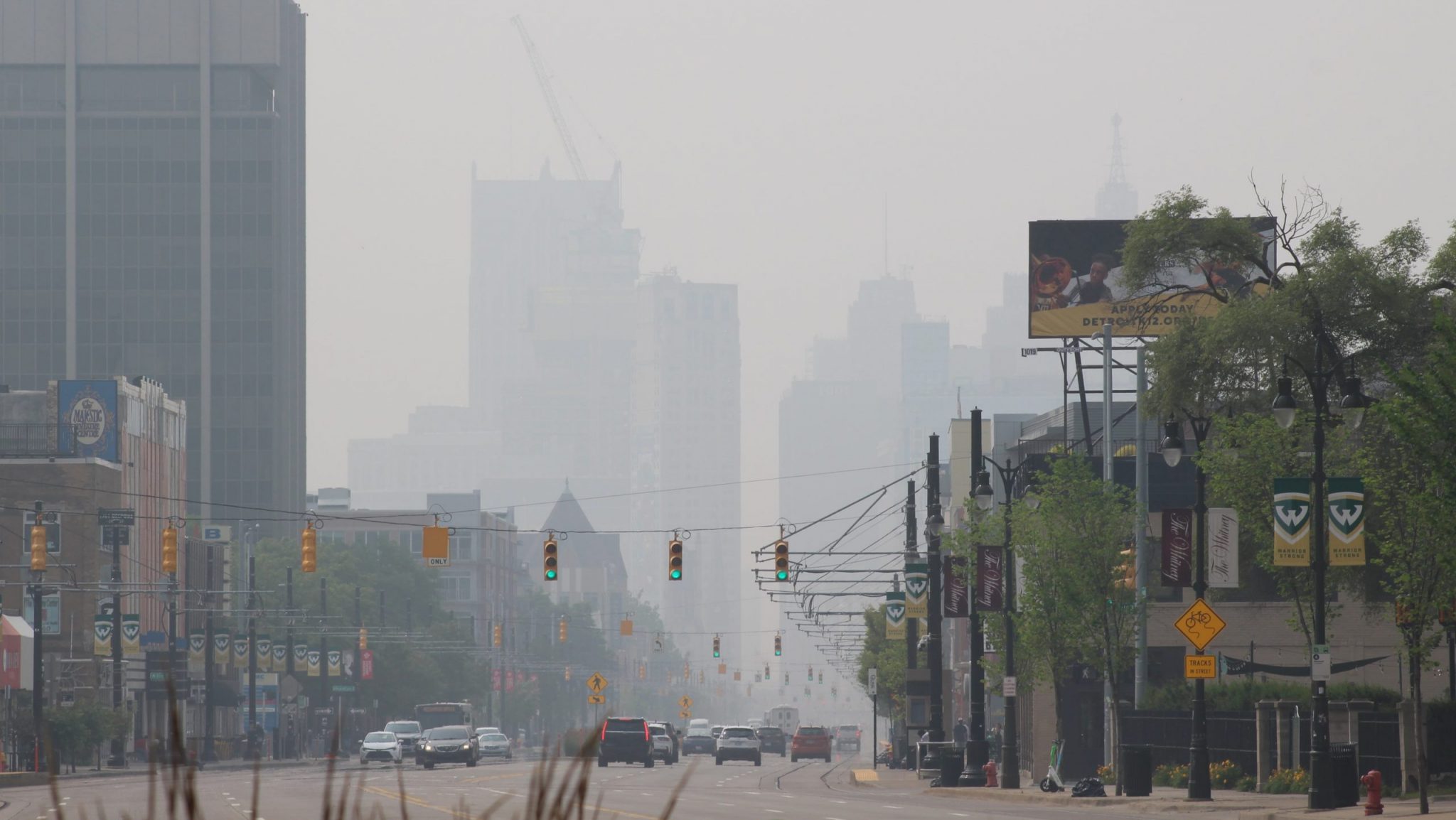Created Equal: Air pollution is plaguing Detroiters’ lungs
Detroit got an ‘F’ for air quality. What does that mean for Detroiters’ health? Planet Detroit Senior Reporter Brian Allnutt and Nick Schroek, associate dean of experiential education at the University of Detroit Mercy Law School, join the show to discuss.

A photo of the Detroit skyline's reduced visibility due to poor air quality in Detroit, Mich. on June 28, 2023.
Detroit’s air is dirty, and according to a new report from the American Lung Association, dirtier than most cities in the U.S.
The organization’s 25th annual “State of the Air” report ranked the region as the 13th worst in the nation for the year-round average level of pollution, and gave Detroit area counties failing grades for ozone and both short-term and annual particle pollution.
Nick Schroeck, associate dean of experiential education at the University of Detroit Mercy Law School, and Brian Allnut, author of the recent Planet Detroit article, “Dirty air: Wayne County gets ‘F’ in 2024 State of the Air report,” joined Stephen Henderson on Created Equal on Thursday to discuss why metro Detroit’s air quality is so bad, and what we can do about it.
Poor air quality poses very real health hazards, especially for people with asthma. Detroit has the second highest prevalence of asthma in the country, according to the Asthma and Allergy Foundation of America.
So, how could Detroit get to a “C” for its air quality in five years? Schroeck provided a short list:
- Enforce existing regulations
- Establish a truck ordinance
- Focus on cumulative impacts with state-level studies
- Move away from combustion vehicles as main form of transportation
To read the full American Lung Association report, visit Lung.org/SOTA.
Monitoring and reporting air quality concerns
- To check the air quality where you live with a live map, go to airnow.gov
- In case of an air pollution emergency, call the Michigan EGLE Pollution Emergency Alerting System (PEAS) hotline at 800-292-4706
- To report air quality concerns, submit the Michigan EGLE Air Quality Complaint Form
Use the media player above to hear the full interview with Schroeck and Allnut.
Subscribe to Created Equal on Apple Podcasts, Spotify, Google Podcasts, NPR.org or wherever you get your podcasts.
Guests:
Brian Allnutt is a senior reporter at Planet Detroit and author of the article “Dirty air: Wayne County gets ‘F’ in 2024 State of the Air report.” He says in general, air pollution has been improving since the Clean Air Act of 1970.
“That’s especially true with things like ozone,” Allnut said. “Michigan has been seeing a lot fewer ozone days in recent years as of other places, like Ohio, but in the last few years, the level of these fine particles have been increasing in the area, and the Lung Association points to climate change.”
Nick Schroek is the associate dean of experiential education at the University of Detroit Mercy Law School. He says in addition to poor air quality, extended exposure to pollution can cause a variety of health problems.
“Our exposure to dust or soot can lodge in our lungs and cause respiratory and cardiac issues,” Shroek said.
Listen to Created Equal with host Stephen Henderson weekdays from 9-10 a.m. ET on 101.9 WDET and streaming on-demand.
Trusted, accurate, up-to-date.
WDET strives to make our journalism accessible to everyone. As a public media institution, we maintain our journalistic integrity through independent support from readers like you. If you value WDET as your source of news, music and conversation, please make a gift today.
